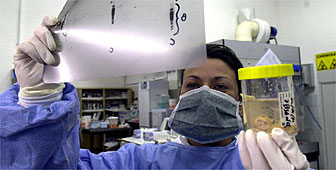More Swiss struck by CJD

The Swiss authorities are baffled by a dramatic rise in the incidence of Creutzfeldt-Jakob disease, which shows no sign of abating.
Figures show that the number of people with the degenerative brain condition doubled in 2001 and that the trend has continued in the first half of this year. The disease, caused by defective proteins known as prions, is the human version of BSE or mad cow disease.
“We are obviously concerned about this rise,” said prion disease specialist, Colette Rogivue from the federal health office. “The real reason for the concern is that we have absolutely no idea why it is happening.”
While none of the cases are “variant CJD”, which is strongly linked to BSE, one conjecture is that mad cow disease could have spread to humans in another form.
Rise in mortality
Since the beginning of last year, the number of CJD cases in Switzerland has risen sharply.
Between 1996 and 2000, Switzerland recorded about ten cases of CJD a year – an incidence of 1.2-1.4 per million inhabitants, which is comparable to other European countries.
But in 2001, 19 cases were recorded in Switzerland, and in the first six months of 2002, there have been another ten cases.
Swiss experts say the rise cannot be dismissed as a statistical fluctuation, and nor can it be attributed to better detection.
“France, Germany, England, Austria all have surveillance systems as good as ours,” Rogivue told swissinfo.
Genetic theory
Genetic causes are also seen as unlikely because screening has shown that there is no familial association between individuals with CJD diagnosed between 2001 and 2002.
“There has been no increase in familial cases in Switzerland,” said Rogivue. “Like everywhere else in the world, these account for around ten per cent of all observed cases.”
Meanwhile, investigations are continuing into whether the infectious prion protein, which causes CJD, could have been transmitted from one patient to another via surgical instruments or some other medical procedure.
“We are looking at the medical records of all cases and we are having interviews with relatives to be really sure that this hypothesis can be ruled out as well,” said Rogivue.
Mad cow disease
While no definitive link has been established between prion diseases in animals and variant Creutzfeldt-Jakob disease in humans, most scientists are convinced that eating meat contaminated with brain and nerve tissue from BSE infected cattle causes the fatal brain disease.
Swiss cattle were hit by a BSE epidemic, which peaked in 1996, but so far there have been no cases of variant CJD observed in Switzerland. Specific risk material was banned from the Swiss food chain as early as 1990.
Among the criteria for defining vCJD is that it strikes mainly young people whereas classical CJD affects mostly those over 60. The Swiss cases show an average age of 67.
However, the federal health office cannot rule out the possibility that BSE has passed into humans and caused this other form.
“This BSE hypothesis has to be discussed because, of course, everyone is asking the question but until now we have absolutely no indication that BSE might be behind the rise in classical CJD in Switzerland,” Rogivue told swissinfo. “If this was the case, it would be something completely new.”
If BSE is the cause of classical CJD, researchers have to work out how the cattle disease can cause two different forms of the human disease – variant CJD in Britain and elsewhere in Europe, and classical CJD in Switzerland.
Preliminary experiments from the UK suggest that British and Swiss cattle harbour the same strains of the infectious prion protein.
by Vincent Landon

In compliance with the JTI standards
More: SWI swissinfo.ch certified by the Journalism Trust Initiative
You can find an overview of ongoing debates with our journalists here. Please join us!
If you want to start a conversation about a topic raised in this article or want to report factual errors, email us at english@swissinfo.ch.